The Wicker Man: The disturbing cult British classic that can't be defined
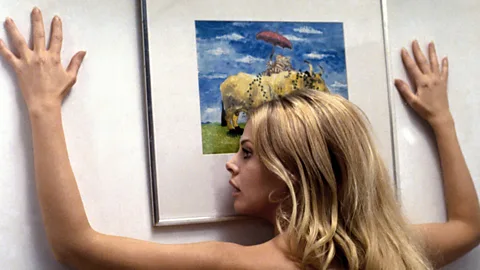 Alamy
AlamyCrime thriller, disturbing fantasy, or folk horror – the 1973 cult hit The Wicker Man refuses categorisation.
For a low-budget film that its own studio head reportedly described as one of the worst they had ever seen, The Wicker Man has done pretty well. Fifty years after being quietly slipped out in a limited release UK double bill (with Don't Look Now) in December 1973, it is hailed among the most influential films of all time. "It changed music, art and film," wrote British Film Institute (BFI) curator William Fowler in a 2013 appreciation Why I Love The Wicker Man.
The Wicker Man has had a unique cultural influence. Its soundtrack, for example, helped spark a new musical genre – often labelled psych folk – while inspiring homages from a host of contemporary acts. These include Pulp's 2001 Wickerman, Sneaker Pimp's 1996 How Do (Willow's Song), and Radiohead's 2016 Burn The Witch. In 2021, Fire Leap by the cutting-edge electronic music maker Gazelle Twin and NYX offered a drone choir riff on one memorable scene.
To mark the approach of the film's 50th anniversary, London's Barbican Centre staged a special concert in June 2023 featuring a contemporary "interpretation" of the soundtrack along with a new suite of folk songs inspired by it. This month, meanwhile, saw the BBC broadcast the world premiere of a radio adaptation of the film.
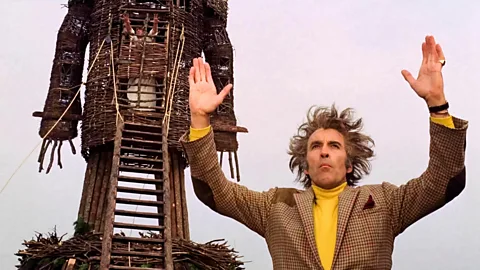 Alamy
AlamyCostumed fans now gather for quirky singalong screenings – while a 2018 UK screening still prompted protests from Christians. This didn't stop the film featuring in the opening ceremony for the London 2012 Olympics as part of a tribute to British cinema. And for a film whose genesis was full of twists and turns, it's appropriate that 2018 saw a Wicker Man rollercoaster ride opened at the Alton Towers theme park.
Origins of a masterpiece
The Wicker Man's roots lay in a little-known 1967 novel by British actor and author David Pinner called Ritual, whose film rights were purchased in 1971 by legendary veteran British horror film actor Christopher Lee. He also starred as Lord Summerisle, later proclaiming it the best film he'd ever made. With Lee on board, the production acquired writer Anthony Shaffer – fresh from the films Sleuth and Frenzy – to provide a screenplay.
However, the studio behind the film – British Lion – was in upheaval at the time, with financial woes and changes at the top. The UK was also riven with industrial unrest, and one reason The Wicker Man may have been given the go ahead was simply to provide production jobs.
Shot over a few weeks in 1972 by first-time director Robin Hardy in the glorious Scottish border region of Galloway, The Wicker Man is a leftfield low-budget yarn involving a straitlaced God-fearing policeman (Sergeant Howie, played by Edward Woodward) sent to investigate the apparent disappearance of a young girl in the remote community of Summerisle.
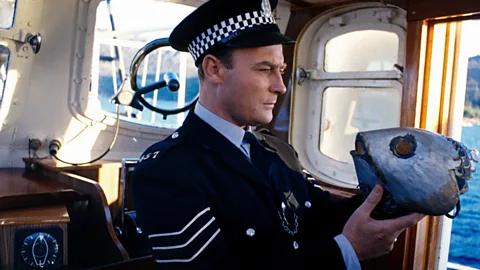 Alamy
AlamyHowie becomes increasingly unsettled by the rituals, passions and startling sights that envelop him here – pickled foreskins in the pharmacist, orgies on the village green – but battles on with his investigation, suspecting the missing girl has been murdered. Her "disappearance" is finally revealed as a trick to bring him to the island. The finale sees Howie trapped – while dressed as the violent "Fool" figure Punch – then burned to death inside a towering wicker man figure as a human sacrifice to pagan harvest gods.
Beyond definition
Though initially marketed as "horror", The Wicker Man is a film that truly resists categorisation. Until the finale, there are none of the frights that define genre horror – in fact, the residents of Summerisle seem blissfully content with their ways, throwing negative judgements back on an audience trying to work out the significance of what is on the screen. "Very few horror films actually have that quality of presenting a plausible reality," argues Gill Jamieson, senior lecturer in Film, Television and Cultural Studies at the University of the West of Scotland.
At different times and from different perspectives, it can feel as though you're watching a crime thriller, a fantasy, a celebration of alternate lifestyles or nature-centred folklore – or brilliantly conceived arthouse cinema. In the 2008 book Fifty Key British Films, Justin Smith considered The Wicker Man "a curious mixture of detective story and folk musical".
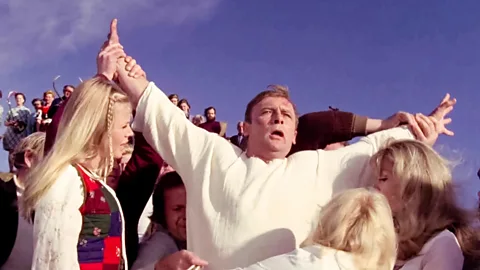 Alamy
AlamyThe Wicker Man can also be watched as a challenge to orthodox religion – not least when Lord Summerisle defends his pagan ethos by wryly questioning Howie's Christian worship of "the son of a virgin impregnated by a ghost". Or perhaps it's the first mockumentary in British cinema history, given an opening credit offering thanks to Summerisle residents "for this privileged insight into their religious practices and for their generous cooperation in the making of this film".
"The Wicker Man is many things," says David Bramwell, who created the Sing-a-long-a-Wicker Man film nights in 2009, and claims to have seen the film more than 150 times. "I think sometimes a film surprises us – films that manifest and we don't really know where they're from," he said. "They seem out of place and time, and hold up because they're not referencing anything around them."
It's a film that plays with audience sympathies, too. "The first time you watch The Wicker Man you can identify with Howie's plight because we've all been in situations we don't understand, we don't have control over," says Jamieson. "But it rewards repeat viewing, too, because once we know the answer to the enigma, we can go back and take pleasure in looking for all the moves on the board."
Afterlife of a masterpiece
One of the most remarkable aspects of The Wicker Man is the soundtrack, whose beautifully skewed folk songs sound ancient despite being composed on the spot by Paul Giovanni, a US writer and actor who had limited knowledge of British folk music.
Adding to the film's mythology is the lack of any recording of its magical soundtrack for many years. In fact, the whole film languished in relative obscurity for well over a decade after its release. That changed in 1988, when a late-night BBC arts series called Moviedrome began its mission to spotlight interesting cult films with a programme that was followed by the first British nationwide network TV showing of The Wicker Man.
As part of the surge of interest that followed, film music collector Johnny Trunk set about trying to find a recording of The Wicker Man soundtrack for public release. The problem was that nobody knew where one was. After several years' search, Trunk was given permission to look through the vaults at Pinewood Studios, where he located a cache of reel-to-reel tapes containing the film's sound effects – as well as the all-important music. But what has made this music carry on resonating?
As a musician familiar with places the film was shot, Eliza Skelton (co-creator of the Sing-a-long-a-Wicker-Man nights with David Bramwell) believes the music manages to tap into "the psyche and lyricism" of the atmospheric Scottish setting. "The songs also lend themselves to lots of arrangements – but still in the folk tradition."
She is echoed by Katy J Pearson, whose 2023 Wicker Man album seamlessly mixes trippy club remixes with classic takes on the soundtrack songs. "Paul Giovanni and Gary Carpenter created something timeless – and unique for the time," she tells BBC Culture. "They managed to merge a lot of old traditional folk songs and poems into an exciting piece of work that could easily fit in with the new alt-folk scene happening today."
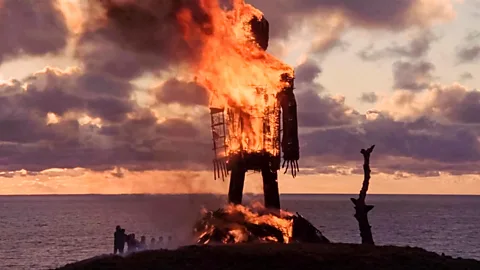 Alamy
AlamyBritish festival culture has also been shaped by the film. A Wicker Man Festival ran every summer in Galloway from 2001 until the death of its organiser in 2015, earning comparisons with the Burning Man event in the US. The popular Green Man festival in Wales still culminates with the burning of a giant wicker figure each year, while New Age travellers have regularly burned similar figures at Glastonbury – where the film was part of the festival's official 2023 programme.
Other factors have added to the film's mystique. It has, for example, seemed close to vanishing from existence at various points. A 2013 feature in the LA Times recounted how the original camera negative and out-takes were accidentally destroyed decades ago, and told the story of how the most complete version of the film then in existence was discovered by chance buried in the Harvard Film Archive. This 92-minute 35mm print, made for 1970s US distribution, formed the basis for director Robin Hardy to produce a "Director's Cut" in his 80s, three years before his death.
Not bad for a low-budget leftfield film released 50 years ago with minimal expectations. Yet like all great art works, its unique vision shone through. "It's about something alien and yet close by," wrote William Fowler in his 2013 BFI appreciation. "It never gets tired."
If you liked this story, sign up for The Essential List newsletter – a handpicked selection of features, videos and can't-miss news delivered to your inbox every Friday.
